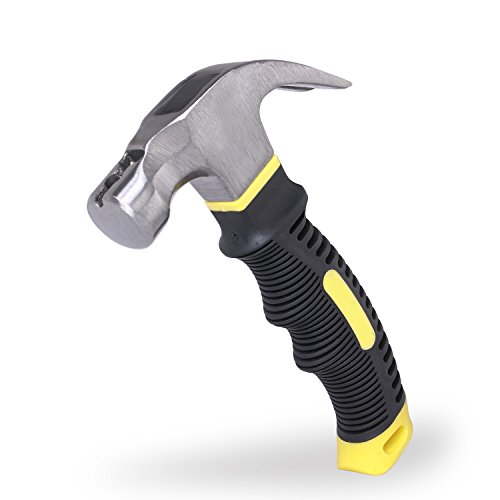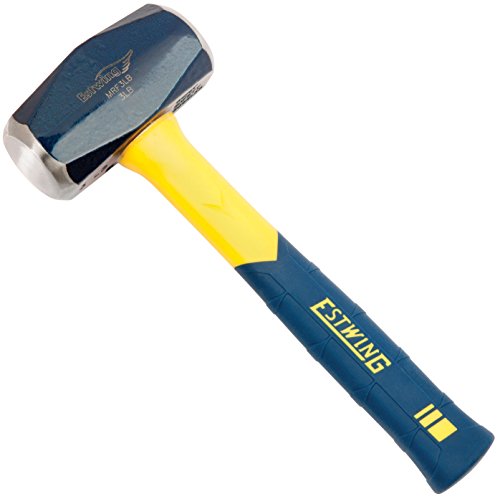The Best Hammers

There are few tools more crucial to a functioning workspace than the trusty hammer. Whether layman or carpenter, quintessential claw, or muted mallet, there's a high probability that the job you're working on is going to require a variety of hammer. Aside from the seemingly obvious use of driving nails, hammers can be used to break up concrete, dislodge a mechanical component, or remove dents from sheet metal. And since employing the wrong tool can ruin a novel task quickly, we recommend getting the right hammer for the job. Below we've gathered five high-quality hammers suitable for everything from household repairs to major worksite undertakings for your review.
EFFICERE Stubby Claw Hammer
Drive The Point Home
Regardless of your craftsmanship level, EFFICERE’s Stubby Claw Hammer can tackle a myriad of projects. Weighing in at a feather-light eight ounces, this surprisingly sturdy hammer is made of alloy steel that delivers power with little exertion. The feature we love the most about this model is the magnetic nail holder in the claw hammer’s head. A favorite of beginners and experts alike, the holder will ensure your first hit is always on point while EFFICERE’s advanced grip handle allows you to confidently finish the job.
Pros:
- One inch diameter head
- Perfect for tight angles and small work areas
- Fiberglass body secured to the head with durable epoxy
- The ergonomic handle prevents vibration or slippage
Cons:
- More experienced individuals might prefer a longer neck for increased force on large objects
Estwing Sure Strike Crack Sledgehammer
Pummel Your Problems Permanently
Estwing’s Sure Strike Crack Hammer is a deceivingly burly sledgehammer suited for those heavy-duty tasks that likely require eye protection and steel-toed boots. With measurements of just under one foot, you could be forgiven for misidentifying the Crack Sledgehammer as a mallet or club hammer, until of course, you pick it up. The head is made of three pounds of tempered steel, giving you enough juice to break up concrete, drive stakes and fence posts, or knock down that dining room wall for a full kitchen renovation. If you need to consider space restrictions during your demolition, Estwing will get that overhaul off the ground in no time.
Pros:
- Great customer service
- Light enough to be used with a chisel for stonework
- Great for splitting firewood with a wedge
- Textured rubber grip
Cons:
- The seal between head and handle could be more durable
TEKTON Double-Faced Soft Mallet
A Friend of the Fragile
If leaving an impression is the last thing you want to do with your project, we recommend a soft mallet. Tekton’s Doubled Faced Soft Mallet to be specific. The heads are made of hard plastic on one end and rubber on the other, giving you a range of power not found on the everyday claw hammer or standard mallet. Tools such as these are great to have when working with wood or softer metals. They’re perfect for hammering together interlocking pine tileboard or driving tent stakes into the ground. Two of the outstanding yet frequently overlooked features of this mallet that elevate it above the rest, in our opinion, are the hollow steel body and rubber handle. By cutting down on weight and not skimping on grip strength, Tekton delivers a superior tool that’s built to last.
Pros:
- 12 Ounces in weight
- Weight is almost entirely in the head due to hollow build
- Heads can be unscrewed and replaced
- 35 mm thick heads
Cons:
- Mallet heads can come unscrewed fairly easily
Real Steel Ultra Framing Hammer
A New Frame of Mind
If you foresee home renovation in your future, Real Steel’s Ultra Framing Hammer should be at the top of your preparation wishlist. If you find yourself staring at this product’s image and the image of a claw hammer and are struggling to spot the differences, we can’t blame you. Although similar, the framing hammer features a straight, or “rip”-style claw, which has more leverage and can pull nails more quickly. Additionally, while the hammer’s milled face should never be used on finished woodwork, it is also ideal for dispensing nails at maximum speed while severely reducing slippage. If you don’t mind leaving a mark, Real Steel is the way to go.
Pros:
- Features magnetic nail starter
- Manufactured from a single piece of steel
- The hammer is made with a graphite core for increased durability
- Truly incredible value for the price
Cons:
- On the heavier side for its size
Neiko Dead Blow Hammer
Deliver the Dead-Blow
For those of you who are fans of the phrase ‘looks can be deceiving,’ I invite you to cast your gaze towards the Neiko Dead Blow Hammer. In no way a child’s replica toy, the hammer’s dead blow style is comparable to the rubber mallet in function, with some caveats. While both dead blow and mallets are designed to deliver a soft albeit firm hit, the dead-blow hammer is hollow and filled with steel shot, meaning recoil from every swing is severely dampened. Neiko’s product has a much smaller diameter head as well, which, in practice, means less force is required to deliver a precise blow to a small surface without leaving a mark.
Pros:
- The unicast plastic molded body prevents degradation
- Comes in four separate weights
- Non-slip diamond pattern handle
- Steel shot head reduces the likelihood of damaging blows
Cons:
- The orange coating may have difficulty standing up to frequent, heavy blows
Frequently Asked Questions
What’s the difference between a mallet and a hammer?
The main factors which differentiate these two tools are materials used and function performed. Hammers are almost always made primarily of steel, and while their function may vary, that function usually does not involve ‘finessing’ two objects into place without leaving a mark. Mallets, on the other hand, are seldom made of steel, have extensive faces, and are principally concerned with exerting small amounts of force over a long period of time. Both hammer and mallet are featured regularly in carpentry, home improvement, and automotive repair.
I have terrible accuracy, and I just purchased a hammer. How do I swing this thing properly and drive a nail?
Before swinging for the fences, first, ensure that the nail you are working with is secured in the magnetic starter or the piece of wood; this can be done by gently tapping the nail until the point is fully concealed by the grain. Once you’ve done this, firmly grab the hammer’s handle and swing at the head using both your forearm and bicep in a sort of half-swing, half-chop motion. If you are unacquainted with handtools, this will take several hundred swings before your accuracy fully develops, but it is still more efficient than taking much smaller swings with your grip closer to the head.
About the Author
Why Trust Us
With the constantly shifting landscape in the world of technology, GameRevolution seeks to provide gamers and tech-enthusiasts with the information they need to select the right products for their needs. Since 1996, our experts have used their knowledge on all the latest gadgets – everything from headphones to standing desks – to help millions of people navigate specs and answer common questions.






